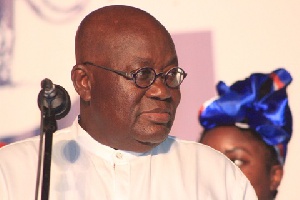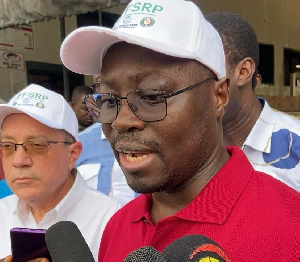By Kwame Attakora Abrefah
A successful society is defined by the opportunities available to its people to live life to their fullest potential. Consequently, government’s role is to ensure a secure and stable environment for its citizens to live in freedom and to eradicate conditions such as corruption, poverty, violence, intimidation, racketeering and oppression, which undermine freedoms.
The 2016 general election was momentous because it allowed the people to choose the political party that would enable them to have fair opportunities and choices in life. Thus, the election gave Ghanaians the opportunity to choose between the alternative visions of growth and development of the two major parties, the NPP and the NDC. The NDC proposed to promote economic growth by investing in infrastructural development such as roads, highways, seaports and hospitals.
The NPP, on the other hand, promised to invest in people by revamping the faltering National Health Insurance Scheme (NHIS), investing in education, rebuilding the Zongo communities, and investing in agriculture.
The verdict was clear. Ghanaians voted overwhelmingly for Nana Akufo-Addo and the NPP. So, what exactly did Ghanaians vote for when they elected Nana Akufo-Addo and the NPP? And what exactly did Ghanaians reject when they voted against the NDC government? First, I will briefly address why Ghanaians voted out the NDC.
I will then respectfully offer ideas about how the NPP government can meet the high expectations of the people by balancing economic growth with sustainable human development strategies to improve both the short and the long-term conditions of the people.
Infrastructure is the foundation upon which every economy is built. In other words, it is a precursor to economic growth. Therefore, the NDC government was right in directing a portion of the nation’s wealth to building roads, highways and hospitals.
Nonetheless, an infrastructure driven development model is notorious for breeding corruption, stifling creativity and creating huge public debts. Corruption occurs in construction projects because contractors pay to obtain contracts at inflated prices. In fact, it is estimated that the average cost of infrastructure projects is inflated by anywhere between 20%-35% just to pay corrupt officials.
The NDC’s infrastructure driven development model failed because: 1) corruption became endemic as public officials redesigned and proposed new projects with few public benefits and many opportunities for kickbacks and racketeering; 2) a handful of political elites and highly connected people captured key state institutions to influence public policy to their advantage; and 3) bribery and corruption induced apathy and stifled creativity in public management as technocrats looked on helplessly while the few elites looted the state.
The NDC also lost power because senior members of the government developed an inflated sense of power and control, seemingly to a delusional level. They believed they could control outcomes beyond their capacities. Why not?
Ultimately, as we often say in the local parlance, money talks. They had accumulated so much wealth that they believed they could win the election by giving goodies to voters, members of the media, chiefs, and other key opinion leaders. Thus, in their delusion, the government underestimated the level of public anger, resentment and mistrust towards it.
The intensity of the election campaign was a clear sign of the struggle to either maintain the status quo or to change the direction of the country.
The level of vigilance at the polls showed that the Ghanaian people were determined to prevent corruption in the electoral process in order to reclaim the state from a few elites who had captured it for their own selfish gains. In sum, the NDC lost the election because its leadership had become too corrupt, insensitive, arrogant and delusional about the extent of their power.
When leaders become selfish and begin to make decisions in the interests of their cronies and families, their power can disappear very quickly. Thus, when the people lost trust and confidence in the NDC’s leadership and governance of the country, the electoral process became the avenue through which to register their discontent.
The incoming NPP government now has an obligation to govern wisely in order to meet the high expectations of the people and maintain their trust. This means the NPP has the serious and unenviable responsibility of transforming the economy, renewing public trust in our democratic institutions, and improving the people’s living conditions.
As daunting as these responsibilities are, it is still the people’s aspirations that provide the clearest lens for understanding the development process that must be undertaken to alleviate their suffering. In essence, the people’s struggle for a future free of political corruption, arrogance, and oppression should form the basis for the new vision and strategies of the President-Elect and his team.
Indeed, the NPP’s Manifesto articulates this vision and serves to carry forward people-centred programs to transform the country. It must, however, be emphasized that the bulk of the work that will develop the country from the perspective of the poor, the marginalized and the middle class still needs to be done, and must be done with experienced hands and in an atmosphere of respect. What follows are a few suggestions about how to meet the people’s expectations.
The NPP’s Manifesto focuses on how to provide better opportunities for the people in order to expand the richness of their lives, rather than the richness of the country -- often quantified by GDP. So how does the NPP approach differ from the NDC agenda if both parties seek to improve the living conditions of the people? Whereas the NDC sought to increase economic growth through building projects, the NPP’s approach is that the peoples’ wellbeing should be the ultimate criteria for evaluating the country’s development, not economic and infrastructural development alone.
The NPP Manifesto thus remains a useful platform for articulating the objectives of development. That said, the government must adopt specific strategies and initiatives to reduce poverty and improve the people’s living conditions in tangible ways. The government’s policies must be guided by the principles that:
1. Economic growth is an essential but not sufficient condition for poverty reduction. Poverty reduction requires strategic initiatives. It involves transformation of institutions, laws, regulations and practices that accentuate and perpetuate poverty;
2. The law must be applied fairly and consistently to guarantee human rights and to prevent discrimination based on ethnicity, political affiliation, and social status;
3. Community partnerships must be forged to build collective responsibility and leadership, and to ensure citizen engagement and participation in governance;
4. Public awareness of, and sensitivity to, issues related to poverty must be enhanced;
5. There must be a shift away from the current antagonistic nature our public discourse, which has been characterized by a pattern of insults of late. When policy makers resist stereotyping based on political and ethnic affiliation, a space for listening with respect and tolerance will open up and thereby elevate public policy discussions to encompass a more complex and nuanced understanding of the choices we have to make to address our challenges.
The NDC government failed because its leaders defaulted to blaming those who posed alternative ideas, thus rationalizing the culture of intolerance and arrogance. Understanding the conditions that created and sustained leadership failure within the NDC is essential to pushing past preconceived notions of ethnicity and rising above the politics of division.
The incoming NPP government must be careful not to repeat the mistakes of the NDC, but rather must focus on reconciling the diverse interests and values in the country to promote integration and national unity.
The NPP government must therefore address two complementary agendas. The first must focus on economic development: how can the economy work for everybody by reducing taxes, creating growth and employment? The second must ask: how can the nation maximize its human capital to improve everyone’s living conditions?
Even more fundamentally, how can the state protect the most vulnerable members of society and ensure the health and wellbeing of families and children? This is an important objective in its own right, regardless of whether the economy is growing at 10% or 15% per annum. These two agendas speak to the nation’s economic and social agenda as well as to the state’s moral and ethical obligations to protect the poor and the vulnerable.
The government must carefully pursue a two-pronged approach to development.
Economic and social development reinforce each other and neither can be achieved without the other. Weak economic growth will reduce revenues and make it harder to reduce poverty. On the other hand, the prospect of social unrest, high crime rates, juvenile delinquency and low productivity reduces consumer and investor confidence, and poses a serious to threat to political and socioeconomic stability in the country.
Therefore, it is essential for the NPP government to pursue policies that promote robust economic growth while adopting specific strategies to reduce poverty, protect the vulnerable and support families. The NPP presented a message of hope to the electorate. Now, the task ahead is to formulate a national vision and an effective plan for pursuing it, and to take the necessary steps to implement its vision.
Kwame Attakora Abrefah is a Legal practitioner based in Edmonton, Canada.
Opinions of Wednesday, 21 December 2016
Columnist: Abrefah, Kwame Attakora















